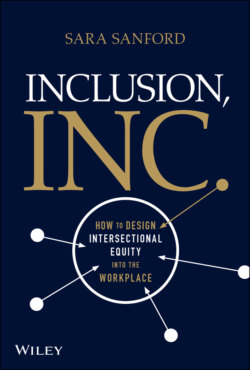Читать книгу Inclusion, Inc. - Sara Sanford - Страница 23
Lean In: The Self-Empowerment Paradox
ОглавлениеIn 2013, the term “lean in” became the rallying cry of (mostly white) women looking to climb the corporate ladder and smash the glass ceiling. Sheryl Sandberg popularized the self-empowerment slogan in her monumental bestseller, Lean In: Women, Work, and the Will to Lead.
Initially, I was one of her early devotees. When the book came out, I was feeling stuck, but still ambitious. I wanted to be taken seriously.
Her book seemed to provide answers. If there wasn't a seat for me at the table, I was going to bring a folding chair! If someone spoke over me in a meeting, I was going to insist on finishing my point. I was going to practice The Shine Theory and highlight the work of other women in the office.
Most daunting: I was going to renegotiate my salary.
I unearthed my copy of Lean In recently and discovered that I had highlighted the entire section that gives tactical advice on ways women can negotiate and still be seen as “likable” enough for their peers to keep wanting to work with them. At the time of my Lean In enthusiasm, my employer was about to be acquired by another company, giving me an opening to renegotiate my role. I was going to pitch myself for a new position, with a new title and a specific salary. I had memorized all of Sandberg's one-liners. I substituted “we” for “I,” because a woman will still be seen as communal if she asserts, “We had a great year,” as opposed to “I had a great year.” I visualized the conversation, including how I would counter potential objections.
I remember being more nervous than I expected, but I stuck to my plan. I was polite but firm. I made the conversation about our common goals, and I concluded with a firm handshake. I left the meeting with the kind of adrenaline high I had only felt in athletic competitions. Whether or not I had persuaded, I had stuck to my guns, and my script.
I got the call: I would be getting a new title and a new salary. At the time, I felt a sense of success beyond myself. It felt like a mini-victory for women, a tiny step toward closing the pay gap.
Years later after I had left that role, I reconnected with a former co-worker from the same company. She had just moved on to a new employer and wanted to share something with me she had held on to for years: The salary I negotiated for myself that day was actually below the bottom of the range for that position at that company. I had leaned in to a starting salary below what they would have offered me, and they said nothing. The amount employers had paid me in the past influenced what I felt comfortable asking for in my negotiation, and this employer took advantage of my own biased baseline. I might have done more to help close the pay gap if I had said nothing at all. By leaning in, I had sold myself short.
